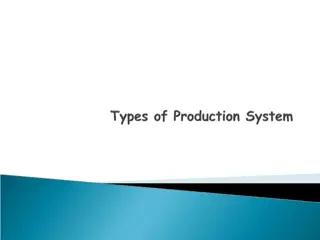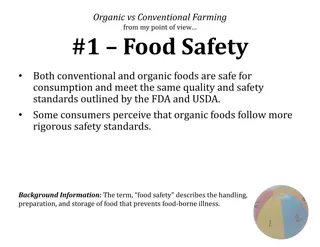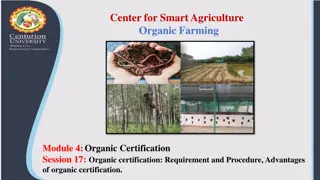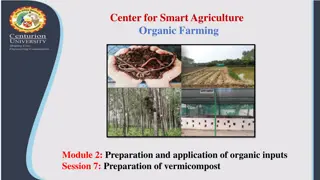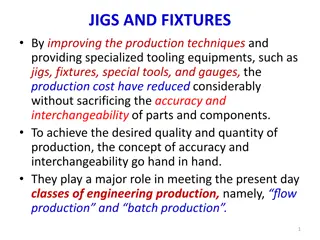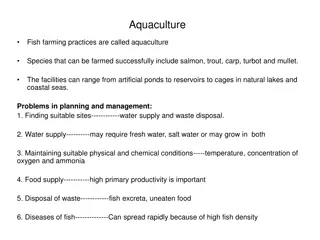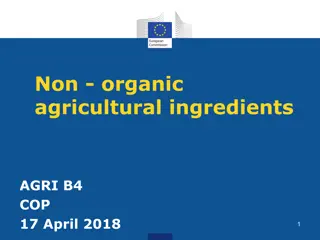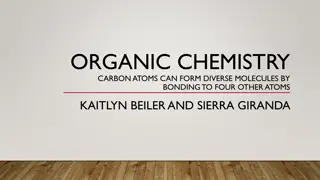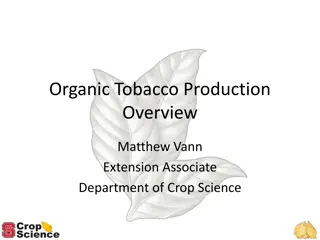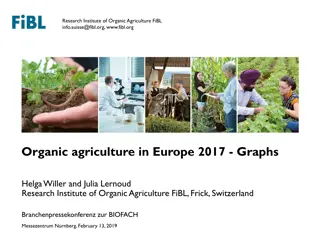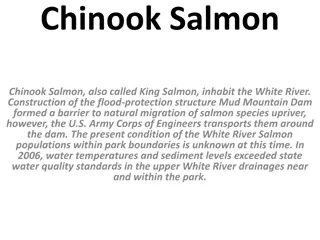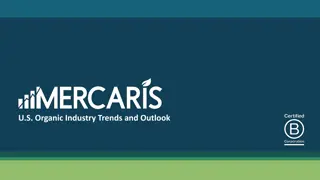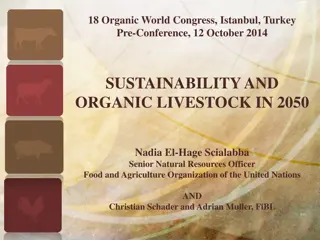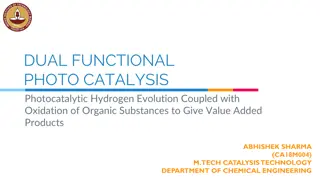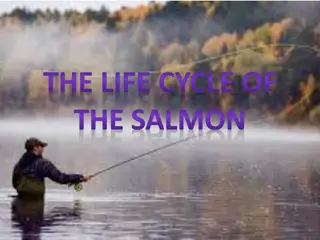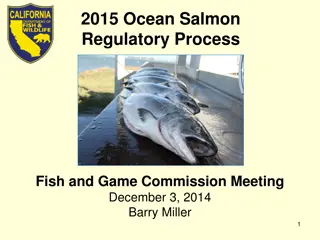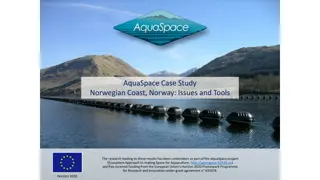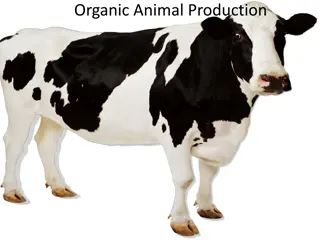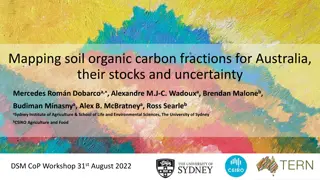Overview of Global Farmed Salmon and Organic Production
The data showcases the production figures for global farmed salmon across various countries, with Norway leading the production, followed by Chile, Scotland, and others. Additionally, insights into the growing organic salmon production, vulnerabilities in the sector, and details on organic mussels production and vulnerabilities are provided. The organic salmon sector faces challenges such as limited organic stock sources and feed vulnerabilities, while the organic mussel sector emphasizes the importance of water quality in maintaining ecological standards.
Download Presentation

Please find below an Image/Link to download the presentation.
The content on the website is provided AS IS for your information and personal use only. It may not be sold, licensed, or shared on other websites without obtaining consent from the author.If you encounter any issues during the download, it is possible that the publisher has removed the file from their server.
You are allowed to download the files provided on this website for personal or commercial use, subject to the condition that they are used lawfully. All files are the property of their respective owners.
The content on the website is provided AS IS for your information and personal use only. It may not be sold, licensed, or shared on other websites without obtaining consent from the author.
E N D
Presentation Transcript
Global Farmed Salmon Production COUNTRY PRODUCTION IN TONNES Norway 1.2 million Chile 800K Scotland 180K North America 162K Faroe Islands 80K Australia 61K Ireland 12-15K Iceland 12K Other 12K
Organic Salmon Production Growing production of organic salmon in other countries Resulted in oversupply and reduction in prices Norway likely to remain conventional but Scotland and smaller producing nations will see it as more attractive COUNTRY ORGANIC PRODUCTION IN TONNES/YEAR (approx.) Ireland 12,000 -15,000 Scotland 20,000 Iceland 25,000 (for 2022) Norway 20,000 -30,000
Organic Salmon Certified Sites 2021 12 Smolt Units & 1 BroodstockUnit 28 Seawater Production Units 3 Primary Processing Units
Vulnerabilities in Organic Salmon Sector Organic Stock Only 2 sources of organic ova available to Irish organic smolt units 1 in Ireland, 1 in Norway Organic Feed Vulnerable position as all salmon feed is imported and there is no direct control over supply. Trace contamination of organic salmon feed with non-permitted substances continues to be an issue Competition Norway, Scotland and Iceland now producing organic salmon 14% reduction in value of first sales in 2021 ( 109m down from 127m
Organic Mussels 70% of rope mussel production is organically certified Equates to around 8,200 Tonnes Not all sold as organic as the market for organic shellfish remains relatively small but increasing
Vulnerabilities in Organic Mussel Sector Water quality be of high ecological status under the Directive 2000/60/EC Water Framework Directive (WFD) or be of good environmental status under the Directive 2008/56/EC Marine strategy Framework Directive (MSFD) or be of equivalent quality to zone A of Regulation (EU (2019/627)
Vulnerabilities in Organic Mussel Sector Production Bay Status under WFD (2018) Area Classification (July 2021) Potential Impact Mulroy Clew Bay Good High A A No impact in short term as area classified as A No impact in short term as area classified as A Major impact, no potential to produce organic mussels in Kilary. Major impact on seasonal production No impact in short term as area classified as A Major impact on seasonal production Major impact on seasonal production Killary Kilmakiloge Ardgroom Bantry Moderate Good Good Good Good High (can produce organic mussels during B period) Good B Seasonal A (1 Oct to 1 June) A Seasonal A (1 Dec to 1 April) Seasonal A (1 Sept to 1 March) Castletownbere Glengarriff Seal Harbour Adrigole Bantry North Snave Bantry Middle (North Chapel) Bantry South (South Chapel) Seasonal A (1 Sept to 1 May) B No impact in short-term as area is of High ecological status Major impact, no potential to produce organic mussels. Bantry Inner Good Seasonal A (1 Mar to 1 June) Major impact on seasonal production Good Seasonal A (1 April to 1 July) Major impact on seasonal production Good High(can produce organic mussels all year round from B area) B Major impact, no potential to produce organic mussels. No impact in short term. Can produce organic mussels during seasonal B period. Dunmanus Roaringwat er B Good Inner is poor, outer is good A No impact in short term as area classified as A Wexford Carlingford North and South Moderate B B Major impact, no potential to produce organic mussels. Major impact, no potential to produce organic mussels.
2022 Plans Develop guidance document for new organic standard Liaise with EPA and Irish Water regarding water quality Online seminars for sector to develop producer knowledge of the new standard Further develop the online toolkit to provide guidance to organic aquaculture farmers https://bim.ie/aquaculture/advisory-services/fish-welfare-workshop/


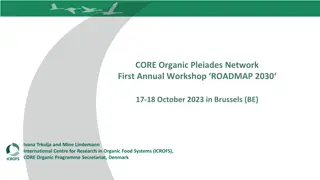
![[✔PDF✔⚡] ✔DOWNLOAD✔ Ancestral Knowledge Of Smoking Salmon: The Ultimate Gui](/thumb/68084/pdf-download-ancestral-knowledge-of-smoking-salmon-the-ultimate-gui.jpg)
